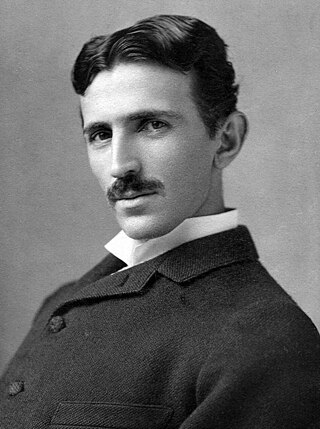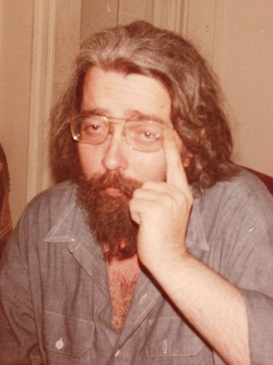
Nikola Tesla was a Serbian-American engineer, futurist, and inventor. He is known for his contributions to the design of the modern alternating current (AC) electricity supply system.
Beorn is a character created by J. R. R. Tolkien, and part of his Middle-earth legendarium. He appears in The Hobbit as a "skin-changer", a man who could assume the form of a great black bear. His descendants or kinsmen, a group of Men known as the Beornings, dwell in the upper Vales of Anduin, between Mirkwood and the Misty Mountains, and are counted among the Free Peoples of Middle-earth who oppose Sauron's forces during the War of the Ring. Like the powerful medieval heroes Beowulf and Bödvar Bjarki, whose names both mean "bear", he exemplifies the Northern courage that Tolkien made a central virtue in The Lord of the Rings.
Valinor or the Blessed Realm is a fictional location in J. R. R. Tolkien's legendarium, the home of the immortal Valar on the continent of Aman, far to the west of Middle-earth; he used the name Aman mainly to mean Valinor. It includes Eldamar, the land of the Elves, who as immortals are permitted to live in Valinor.

Peter Lamborn Wilson was an American anarchist author and poet, primarily known for his concept of Temporary Autonomous Zones, short-lived spaces which elude formal structures of control. During the 1970s, Wilson lived in the Middle East and worked at the Imperial Iranian Academy of Philosophy under the guidance of Iranian philosopher Seyyed Hossein Nasr, where he explored mysticism and translated Persian texts. Starting from the 1980s he wrote numerous political writings under the pen name of Hakim Bey, illustrating his theory of "ontological anarchy".
In J. R. R. Tolkien's Middle-earth, the Eagles or Great Eagles, are immense birds that are sapient and can speak. The Great Eagles resemble actual eagles, but are much larger. Thorondor is said to have been the greatest of all birds, with a wingspan of 30 fathoms. Elsewhere, the Eagles have varied in nature and size both within Tolkien's writings and in later adaptations.
Robert Evan Ornstein was an American psychologist, researcher and author.
Balin is a fictional character in J. R. R. Tolkien's world of Middle-earth. A Dwarf, he is an important supporting character in The Hobbit, and is mentioned in The Fellowship of the Ring. As the Fellowship travel through the underground realm of Moria, they find Balin's tomb and the Dwarves' book of records, which tells how Balin founded a colony there, becoming Lord of Moria, and that the colony was overrun by orcs.

Peter Warren Singer is an American political scientist, an international relations scholar and a specialist on 21st-century warfare. He is a New York Times bestselling author of both nonfiction and fiction, who has been described in The Wall Street Journal as "the premier futurist in the national-security environment".
John Ward, also known as Birdy or later as Yusuf Reis, was an English pirate who later became a Corsair for the Ottoman Empire operating out of Tunis during the early 17th century.
James MacGregor Burns was an American historian and political scientist, presidential biographer, and authority on leadership studies. He was the Woodrow Wilson Professor of Government Emeritus at Williams College and Distinguished Leadership Scholar at the James MacGregor Burns Academy of Leadership of the School of Public Policy at the University of Maryland, College Park. In 1971 Burns received the Pulitzer Prize and the National Book Award in History and Biography for his work on America's 32nd president, Roosevelt: The Soldier of Freedom.
Otto Penzler is an American editor of mystery fiction, and proprietor of The Mysterious Bookshop in New York City.

Ron Kolm is an American poet, writer, editor, archivist, and bookseller based in New York City. Known as "one of the mainstays of the downtown (literary) scene," Kolm is also a founder of the Unbearables, a "ragtag bunch of downtown poet-troublemakers."

Timothy P. Egan is an American author, journalist and former op-ed columnist for The New York Times. Egan has written nine books. Egan, a third-generation Westerner, lives in Seattle.
Númenor, also called Elenna-nórë or Westernesse, is a fictional place in J. R. R. Tolkien's writings. It was the kingdom occupying a large island to the west of Middle-earth, the main setting of Tolkien's writings, and was the greatest civilization of Men. However, after centuries of prosperity many of the inhabitants ceased to worship the One God, Eru Ilúvatar, and rebelled against the Valar, resulting in the destruction of the island and the death of most of its people. Tolkien intended Númenor to allude to the legendary Atlantis.
Morgoth Bauglir is a character, one of the godlike Valar and the primary antagonist of Tolkien's legendarium, the mythic epic published in parts as The Silmarillion, The Children of Húrin, Beren and Lúthien, and The Fall of Gondolin.
The Valar are characters in J. R. R. Tolkien's legendarium. They are "angelic powers" or "gods" subordinate to the one God. The Ainulindalë describes how some of the Ainur choose to enter the world (Arda) to complete its material development after its form is determined by the Music of the Ainur. The mightiest of these are called the Valar, or "the Powers of the World", and the others are known as the Maiar.

Noah Keefer Strycker is an American birdwatcher. In 2015, he set a record for a worldwide Big year of birding, seeing 6,042 of the world's estimated 10,365 bird species at the time (58.3%), becoming the first person to record half of the world's birds in one year. His journey spanned 41 countries and all seven continents from January 1 to December 31, 2015.

William Buckhout Greeley was the third chief of the United States Forest Service, a position he held from 1920 to 1928. During World War I he commanded U.S. Army forest engineers in France, providing Allied forces with the timber necessary for the war effort.
Marcus Wicker is an American poet. He is the author of the full-length poetry-collections Silencer—winner of the Society of Midland Authors Award and Arnold Adoff Award for New Voices—and Maybe the Saddest Thing, selected by D. A. Powell for the National Poetry Series. Wicker is the recipient of fellowships from the Harvard Radcliffe Institute for Advanced Studies, the National Endowment for the Arts, and the Poetry Foundation. His work has appeared in various literary and commercial publications including The Nation, The Atlantic, Oxford American, The New Republic, Ploughshares, Poetry, and elsewhere. He teaches creative writing in the MFA program at the University of Memphis.

J. R. R. Tolkien, a devout Roman Catholic, created what he came to feel was a moral dilemma for himself with his supposedly evil Middle-earth peoples like Orcs, when he made them able to speak. This identified them as sentient and sapient; indeed, he portrayed them talking about right and wrong. This meant, he believed, that they were open to morality, like Men. In Tolkien's Christian framework, that in turn meant they must have souls, so killing them would be wrong without very good reason. Orcs serve as the principal forces of the enemy in The Lord of the Rings, where they are slaughtered in large numbers in the battles of Helm's Deep and the Pelennor Fields in particular.







